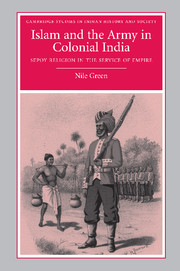Book contents
- Frontmatter
- Contents
- List of illustrations
- Preface and acknowledgements
- A note on terminology
- Glossary of Urdu and Anglo-Indian terms
- Map Nizam's State and its cantonment towns
- Cambridge Studies in Indian History and Society
- Introduction
- 1 Traditions of supernatural warfare
- 2 The padre and his miraculous services
- 3 Allah's naked rebels
- Conclusions
- Notes
- Bibliography
- Index
Preface and acknowledgements
Published online by Cambridge University Press: 29 July 2009
- Frontmatter
- Contents
- List of illustrations
- Preface and acknowledgements
- A note on terminology
- Glossary of Urdu and Anglo-Indian terms
- Map Nizam's State and its cantonment towns
- Cambridge Studies in Indian History and Society
- Introduction
- 1 Traditions of supernatural warfare
- 2 The padre and his miraculous services
- 3 Allah's naked rebels
- Conclusions
- Notes
- Bibliography
- Index
Summary
‘As July advanced, the bazaar at Malakand became full of tales of the Mad Fakir. A great day for Islam was at hand. A mighty man had arisen to lead them.’ So wrote the young Winston Churchill in his account of the rise of Mullā Mastān, ‘the Mad Fakir of Swat’, on India's North-West Frontier in the 1890s. Churchill was by no means the first Englishman to spread rumours of rabble-rousing ‘fakirs’, and, from the southern to the northern tip of the subcontinent, the imperial memoirs of many a British officer are replete with similar stories. Such tales were a common currency of the old India hand and a familiar pattern in the discursive fabric of empire. In the wake of the Sepoy Rebellion of 1857 especially, one strand of this fabric lent colour to reports about faqīrs rousing trouble among Indian soldiers under British command. By the 1920s, the tales of faqīr intrigue reached a crescendo of incredibility. It is to Raleigh Trevelyan that we owe the recording of perhaps the most extraordinary account of a faqīr-instigated rebellion. Trevelyan records how at the time of the Bacha-ye-Saqaw uprising in Afghanistan in the late 1920s,
A ridiculous rumour had circulated in India that T. E. Lawrence – when as Aircraftman Shaw he was trying, or pretending, to lead an anonymous life in the desert outpost of Miramshah in Waziristan – was behind the rebellion. It had actually been claimed that Lawrence had dared to disguise himself as a holy man.[…]
- Type
- Chapter
- Information
- Islam and the Army in Colonial IndiaSepoy Religion in the Service of Empire, pp. ix - xiiiPublisher: Cambridge University PressPrint publication year: 2009



